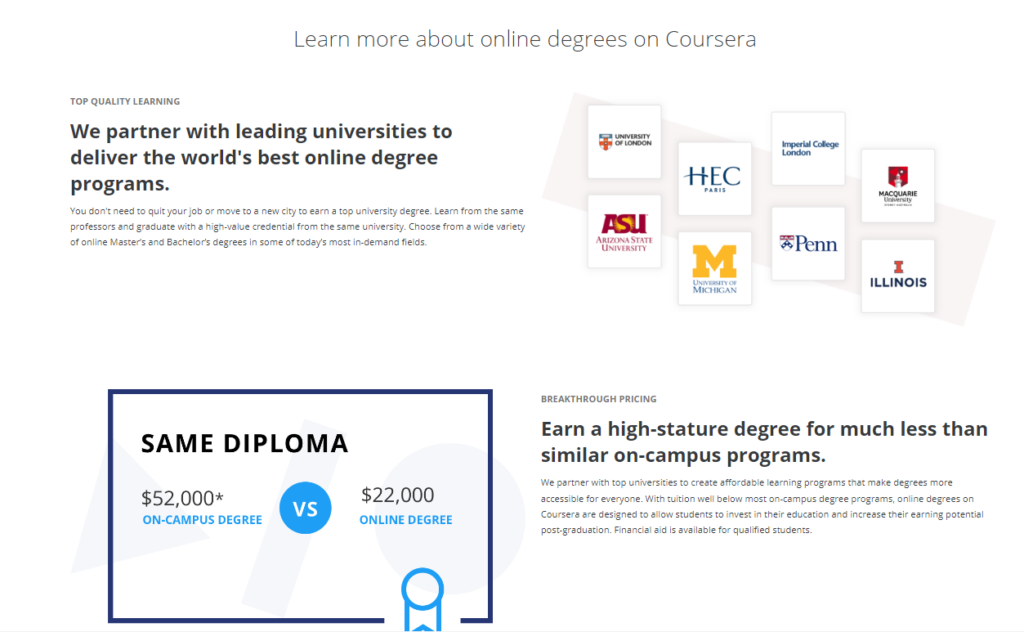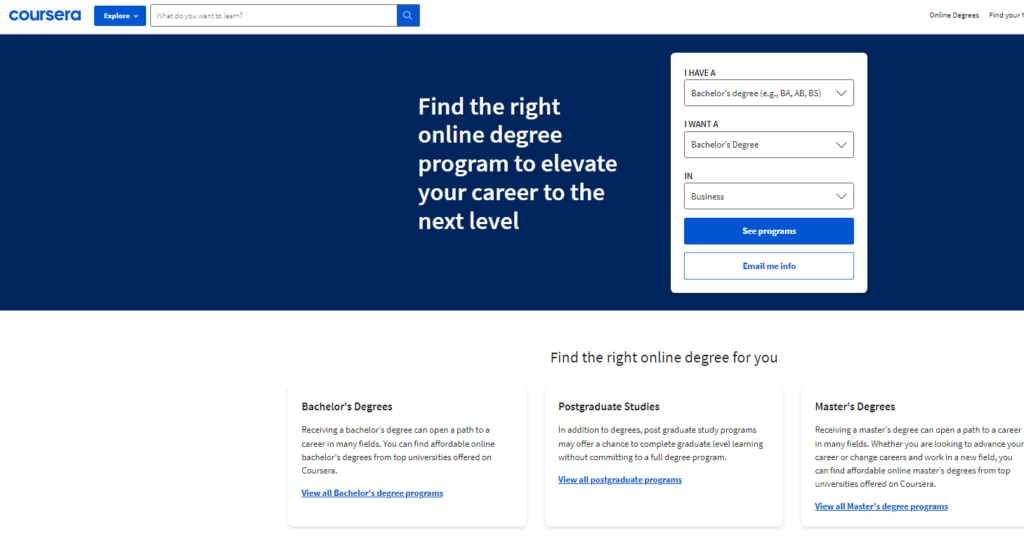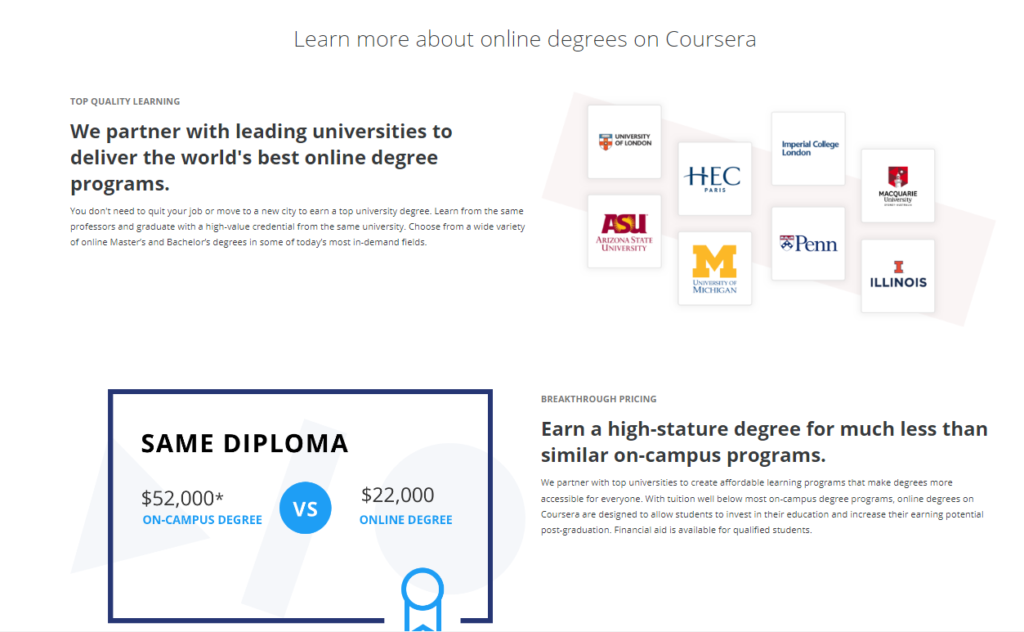Publish Date - December 29th, 2021
|Last Modified - March 7th, 2023
Coursera, a popular online course provider with over 82 million learners around the world, partners with over 200 leading universities and companies (worldwide) to train, evolve, and provide upskilling for students who are looking to better themselves personally and professionally. In 2020 over 2019, this tool achieved a 60% growth in learners, 250% growth in enrollments, and over 160% growth in hours learned by users. How has it been able to be so successful? The answer lies in that almost all Coursera’s content is video lecturing, which has become the fundamental norm for many students and lifetime learners today.
While some could argue it’s the COVID-19 pandemic that’s contributed to Coursera’s overwhelming success (which definitely has a macro impact), there may be other forces at play driving more growth to Coursera. For example, the fact that with this tool, a person can learn at their own pace in the comfort of their home and on their own preset schedule. With this in mind, in this series of posts on accredited online learning platforms, let’s dive into the world of Coursera. Below, I’ll compare it to other popular competitors and see if it’s truly an accredited tool.

My experience with Coursera courses
As I wrote in my previous article looking at Udemy courses, I enjoy taking courses on many different digital platforms, with Coursera being one of the best that I’ve tried. Over multiple Coursera accounts, I’ve done 3 or 4 of its courses – with the most recent one capturing my passion for automation and Python.
While I may not be a veteran in Coursera, I’ve gone through many aspects of their platform to be able to formulate an opinion and draw several comparisons as compared to other platforms that I’ve used, including Udemy, Lynda, Udacity, and freeCodeCamp.
Are Cousera courses actually accredited?
Coursera is not accredited from an organizational standpoint. It needs to be referenced and approved by the department of education in the US, or CHEA and SCC in Canada, or any other legislative body within a particular country that a student is studying. However, many of Coursera’s courses were designed and authored by renowned universities across the world, which includes (but not limited to):
- University of London (England)
- University of Illinois (US)
- University of Pennsylvania (US)
- Yale University (US)
- University of Toronto (Canada)
- Imperial College London (England)
- Stanford University (US)
Many of these online degrees and courses will either be an accredited degree, or quite possibly count toward your college credits if you’re enrolled in a particular degree program as a student. Therefore, in some sense, some of Coursera’s courses are accredited because they’re sponsored and created by accredited institutions.
Is Coursera worth it?
There’s no doubt that Coursera has a wealth of content, which spans hundreds of universities and Fortune 500 companies such as Google and IBM . Here are some of the things that Coursera offers in the way of degree programs, certifications, and specializations.
1. Guided Projects

Courses for if you want to figure out how to upskill and learn more about a specific specialization or platform. For example, if you want to quickly learn how to use docker or a particular skill like trying to data analyze COVID-19 using python, then these courses are meant for you!
This is for you if:
- You’re learning one or two new skills, or polishing already existing skills.
- Trying to pick up something that’s trending currently (So as of 2023 right now, COVID19 scanners and React Native are big topics).
2. General Courses for Students
These are free (or super cheap) courses built for enhancing knowledge and providing people with the ability to understand and do more. General courses like Machine learning and Introduction to Psychology are offered as basic introductory courses for people who are either just getting started or trying to learn a new set of skills.
These courses remind me of podcasts to some degree, since there’s very limited interaction.
This is for you if you’re:
- Looking to gain general knowledge, or want to learn about a topic that may not necessarily be your desired discipline.
- Want to pass the time and learn some general knowledge on a new topic to impress your friends or enhance your conversational knowledge or some general personal development.
3. Specializations
This is where Coursera shines – specializations provide high-quality certifications that are audited and designed by industry leaders. While they are beginner level, they will allow you to learn entire sets of skills so that you can break through (or at least begin) the path of penetrating into a particular industry. Whether it’s learning python from scratch, or Deep learning – “specializations” feel like a more paid version of the general courses. They remind me of introductory/intermediate courses in college.
This is for you if you’re:
- A person who wants to build a new skill and be relatively proficient in it at the end (that is, if you don’t cheat 😉 ).
- Need to up skill in a particular category and will use that skill actively in their new job or role / position.
Note: The difference between general courses and specializations is that the latter is more hands-on and has more practical exercises to learn the skills faster.
4. Professional Certifications
An extremely thorough and comprehensive set of guided projects, courses, and specializations that aim to get you a job. I believe that this is where Coursera makes the most of its revenue as these certifications are offered by some of the world’s largest companies, including Google, Meta (Facebook), IBM, and Salesforce.
This is for you if you’re: Interested in pursuing a particular career and want to see what large companies can expect from you. While professional certifications do not guarantee to get you hired, they will allow you to develop the basic skills to know what’s required on the job, and help you grow those skills until you get that job.
5. Online Degrees
Coursera has several online degrees that range from bachelor to master’s degree .Whether it’s business, IT, humanities, or marketing – each degree is available at the tip of your fingertips – literally, since they’re offered remotely. While they can cost an upward of $2,000 or more, Coursera’s online degrees are extremely comprehensive and make you feel as if you’re studying in college. These courses follow a semester structure, needing you to apply and wait for the classes to start. This higher education can also be extremely time consuming; requiring between 15 to 30 hours of time per week for two to four years (depending on your dedication).
This is for you if you’re:
- Someone who wants to upskill and get a new degree to move into another sector, but wants to do it from the comfort of their own home.
- Someone who wants to save money on a degree (these degrees are thousands of dollars less).
- Needs to balance a job, degree or family at the same time.
6. Patented MasterTrack® Certificates
A more fast-tracked aggressive training program. These certificates are essentially fast-tracked sets of courses that allow you to have a ‘Master of Science’, for example, if you pass them. While enrollment is still semester-based, you will complete a number of Coursera courses that are verified by the relevant colleges.
For example, the MasterTrack course Machine Learning for Analytics from the University of Chicago asks for you to finish four courses in roughly 7 to 8 months. These courses are:
- Statistical Thinking for Machine Learning
- Advanced Statistical Thinking for Machine Learning
- Introduction to Machine Learning
- Advanced Applications
Each of these have major projects that need to be completed at the end of each course.
This is for you if you’re: Someone who wants to accelerate their learnings for a degree, and is not afraid to sacrifice a lot of time in the short-term to get a degree in a very specific field.
They also offer specific content for those in business and enterprise companies, government, and current students enrolled in university.
Finally, Coursera offers Coursera Plus which gives you the ability to get many of the courses you’d pay for a la carte, for a flat monthly fee. However, be aware that some courses available in Coursera are not incorporated into Coursera Plus. It’s always good to do your research beforehand on the courses you’re interested in to make sure they are available for you.
For example, the Google IT automation course that I am currently doing is not offered in Coursera Plus, so I need to sign up for VIA professional certification.
Can Coursera get you a job?
So there’s your breakdown of Coursera and what it offers. There’s no doubt that it has a plethora of courses, certifications, and degrees to choose from and further your knowledge. However, will they help to get you the job you want (as that’s what we would equate as valuable)?
The answer has a few parts.
While Coursera’s courses are great for learning, they’re not all that hard to actually complete. It’s common knowledge that MOOCs (Massive Open Online Courses) are bereft of cheating as there’s no way to 100% validate that you are indeed the person taking the test, doing the assignments, and completing the projects (like a traditional university course).
The fact is, it’s extremely easy to cheat with all MOOCs, with Coursera no exception!
An MIT study done in 2015 showed that out of 13,500 students registered for an edX (a popular online learning platform run by Harvard and MIT) introductory mechanics course , 495 received the certificate (it’s actually 502, but they omitted 7 for technical reasons). Out of those 495 students, 65 were detected using CAMEO analysis (Copying Answers using Multiple Existence Online), which is the act of searching for an answer and copy and pasting it to pass the course or assignment. The study used multiple factors to positively/statistically identify a user of CAMEO, including:
- Answering the question very quickly.
- Guttman error (the concept of answering easier questions incorrectly, and harder questions correctly).
- Unusual response patterns (which causes an increase in standard error).
This means that 13% of students were in fact cheating on the edX course based on this algorithm. With the understanding that there are obvious limitations on this one study for this one edX introductory course (the hypothesis is, the more complex the course, the higher the cheating rate), this is still a lot of people cheating to get a verified certificate. With this in mind, how can recruiters and hiring managers positively look at these certifications knowing that it’s so easy to cheat to get them? If you were a hiring manager or a recruiter and knew that almost 15% of students had cheated on their final exams (every year) to graduate and receive their degree, would you think positively about that school? I personally would not!
With that in mind, and to finally answer the question of whether adding a Coursera certification to your resume or CV will make a difference, I would say that the benefit is minimal. Speaking from a hiring manager perspective (and I’ve looked over resumes for multiple engineer, product, and marketing roles at startup, midsize, and enterprise companies), I would argue that due to the fact that they’re so easily acquired and are relatively new, it does show that you have an interest in growing your skills in a particular field or job, but that’s it does. It won’t substitute for on-the-job experience, or a degree from a highly renowned university or college.
However, what the certifications can do is provide you with the necessary skills and knowledge to ace the exam or compose a killer resume.
For example, if you’ve taken a certification in machine learning and AI, did not cheat and passed with a high grade, then it’s likely that you’ve absorbed some very applicable skills to jobs like a data scientist or a data engineer. You can also now add your newly learned skills to your resume or LinkedIn profile. Or, build your own algorithm and publish a portfolio on GitHub for the hiring managers to see.
Ultimately, I think where Coursera truly stands out from the competition is providing applicable training in skills that are in demand from the top employers in the US and across the world. Then, it’s what you do with those taught skills and how you apply them that will dictate whether you get a job in a growing field.
Wrapping it all up: Are Coursera courses worth it?
Coursera is extremely popular among students and other learners, garnering the interest of millions across the world. The ability to complete Guided Projects, general courses, certifications, and even specializations from literally anywhere and at your convenience is likely the key factor behind its success and popularity.
Out of the many other online learning platforms that I’ve taken courses on – including Udemy and Udacity – Coursera is one of the best I’ve tried. However, officially the online platform is not accredited. This being said, its courses can be referenced and approved by legislative bodies. This is rightfully so as many of its courses are designed and offered by top universities and colleges including Stanford and Imperial College of London.
While the main advantage of Coursera is the sheer amount and variety of content and courses it offers – from management to emotional intelligence to psychology – its main drawback is that it’s in the category of MOOCs. This being said, it’s still worthwhile to pursue a Coursera certification or degree for hiring managers that value a resume that shows the willingness to learn, and for your own added knowledge to be able to pass exams and land the job of your dreams.
In sum, I believe that Coursera is indeed worth the investment because many of its courses and certifications are created by industry leaders and notable universities, which, on its own, offers an advantage over other suitable candidates to relevant positions.
With their certifications provided by companies like Google and Amazon for a moderate amount of money, Coursera can give candidates the potential and clout to be brought on to a tier 1 company.
Give it a try and let me know your thoughts!
Did I miss anything? Let me know!
While Coursera certificates can definitely help show that you have an interest in a particular field, they will not help when it comes to getting a higher SAT score or passing an entrance exam specifically. Some universities, once you’re accepted, may allow you to substitute some of Cousera’s online courses for courses within your curriculum, but there are very few.
While there are no studies that analyze whether hiring managers and recruiters actually recognize Coursera certifications, having been a hiring manager myself and having completed Coursera certifications,I don’t think that they’re as or more recognized as job experience or accredited degrees/diplomas. This being said, the intrinsic value of the knowledge itself and the interface that Coursera uses is definitely a plus.
So while some courses will allow you to get Masters and Bachelor degrees (because they’re accredited by external universities but on Quora), most courses will not give you a college credit. Ultimately, you’ll want to check with your registrar or admissions office to see whether or not any Quora courses can be supplemented for your degree.

I’ve been struggling to decide if this is worth my little money. Scouring the internet for any information regarding the legitimacy of the site. This was very informative but I’m still unsure. I guess I’m wondering if they will try to become accredited and why have not this far. Anyways thanks for the information .
Hey Mallory,
Like everything online it’s tough to figure out whether not to double down or not.
My experience with Coursera (I’ve done ~10 courses now), is it’s pretty immersive – but it doesn’t make up for in-person classes.
It also depends on the course that you’re applying to. Are you doing a degree? Or are you doing just a certificate.
Let me know, and maybe I can provide some guidance!
Cheers,
Will
Well since they are not accredited. I’m now thinking of maybe some kind of certificate. I also was thinking of reaching out to companies to see where they stand on the certificates offered by Coursera.
Well thank you very much for a valuable information I have got cleared all my doubts after reading your blog
Hey Aditya,
No problem – let me know if there’s anything you’d like me to review or if you’d like advise on anything having to do with lifetime learning, web development, product / project management or marketing.